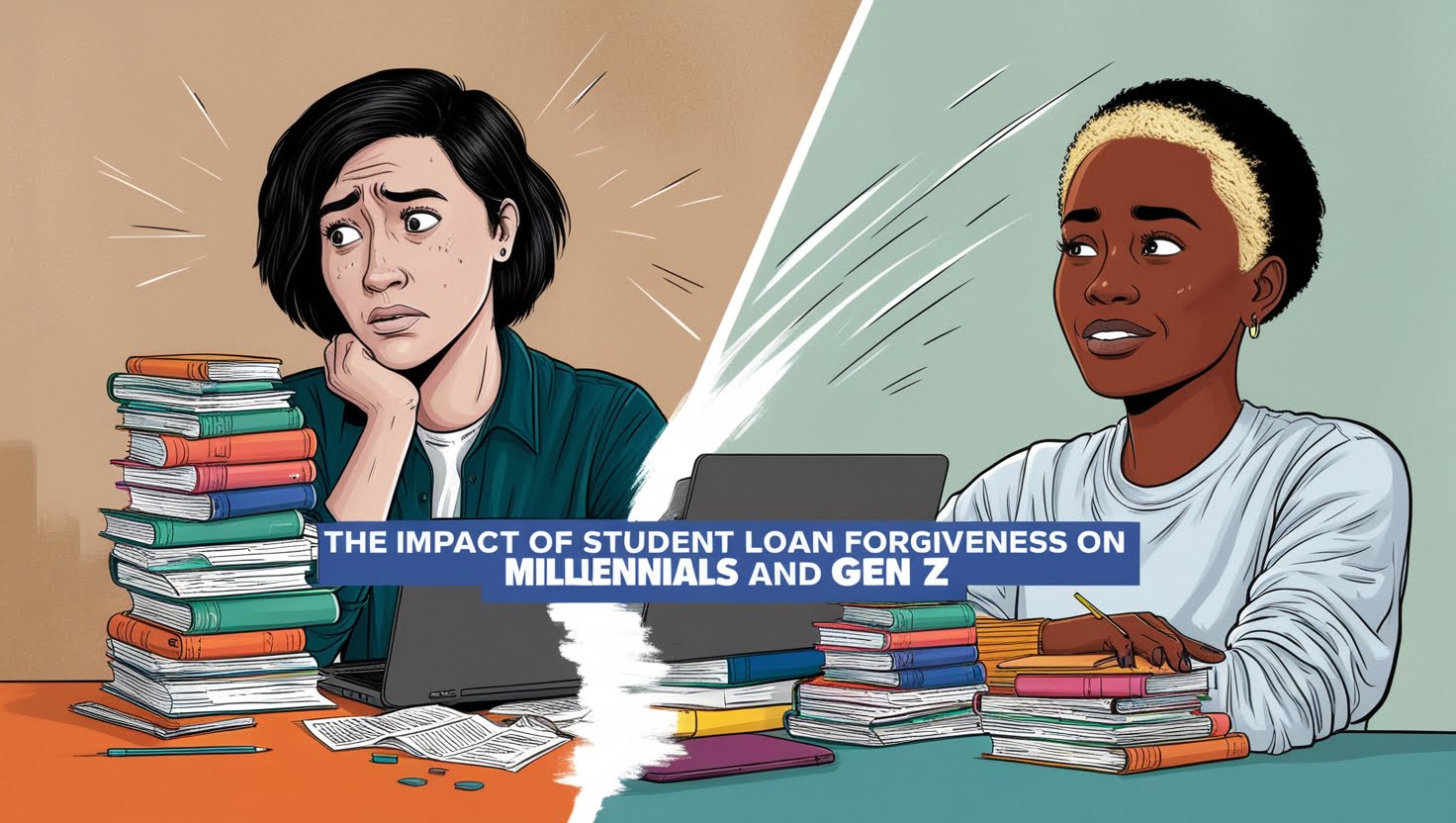
The Impact of Student Loan Forgiveness on Millennials and Gen Z-In recent years, the conversation surrounding student loans has reached a fever pitch, especially as discussions about student loan forgiveness gain traction. For Millennials and Gen Z, these discussions aren’t just theoretical; they represent a potential lifeline that could alter the trajectory of their financial futures. But what exactly does student loan forgiveness mean for these younger generations? Let’s dive into the implications, challenges, and opportunities that come with this significant policy shift.
Understanding Student Loan Forgiveness

At its core, student loan forgiveness is the cancellation of some or all of a borrower’s student debt. In the U.S., the amount of student debt has ballooned to over $1.7 trillion, affecting millions of borrowers. For Millennials, who graduated during or after the 2008 financial crisis, and Gen Z, many of whom are just entering the workforce, the burden of this debt can be overwhelming. Student loan forgiveness programs aim to relieve some of this financial stress, offering a chance to start anew without the weight of crippling debt.
Financial Freedom and Opportunities
For many Millennials and Gen Zers, student loan forgiveness could mean newfound financial freedom. With less money allocated to debt repayment, individuals can redirect their resources toward saving, investing, or even pursuing further education. This shift could stimulate the economy as young people begin to spend more on homes, cars, and other consumer goods.
Imagine a recent graduate, burdened by thousands of dollars in student loans, who suddenly finds their debt wiped clean. This individual may finally feel secure enough to pursue a career in a field they are passionate about, rather than one solely for financial stability. Forgiveness could allow for a renaissance of creativity and innovation among young people, fostering entrepreneurship and artistic endeavors that might otherwise be stifled by the fear of debt. (Read More: Fostering Strong Bonds: The Power of Community and Parent Involvement 2024)
Mental Health Benefits

The mental health implications of student loan debt cannot be understated. For many young people, the stress of repaying loans can lead to anxiety and depression. According to various studies, individuals with significant debt often report higher levels of stress, which can affect overall well-being and life satisfaction. By providing a path to forgiveness, policymakers could alleviate some of this burden, leading to healthier, happier generations.
The Inequity Factor
However, it’s essential to acknowledge that the benefits of student loan forgiveness may not be evenly distributed. Critics argue that blanket forgiveness could disproportionately benefit those who attended prestigious universities and earned higher degrees, often resulting in higher-paying jobs. This raises questions about equity and fairness, especially for those who didn’t have the opportunity to attend college or who entered the workforce directly after high school.
Moreover, the conversation around student loan forgiveness often neglects the significant challenges faced by individuals from lower-income backgrounds. These groups may have less access to higher education and, therefore, may not be as heavily affected by student loan policies. Addressing these disparities is crucial to ensure that forgiveness measures benefit all students, particularly those from marginalized communities. (Read More: The Role of Early Childhood Education in Children’s Development in 2024)
The Future of Education Financing

As Millennials and Gen Z navigate the complexities of student loans, the conversation about education financing is evolving. Student loan forgiveness could spark a broader reevaluation of how we fund higher education in the U.S. Advocates argue for more accessible and affordable education, aiming to prevent future generations from facing similar debt burdens.
Policymakers may consider implementing changes such as income-driven repayment plans, tuition-free community college, or even expanding Pell Grants to support low-income students. These measures could help create a more sustainable system that prioritizes education as a public good rather than a profit-driven enterprise.
The Road Ahead
While the potential for student loan forgiveness is a beacon of hope for many, the road ahead is still fraught with challenges. Ongoing legal battles and political debates threaten the implementation of forgiveness programs. Moreover, the economic implications of widespread forgiveness—such as the impact on taxpayers and the federal budget—remain hotly contested topics.
As Millennials and Gen Z continue to advocate for policies that promote financial equity and access to education, it’s clear that student loan forgiveness is not just a financial issue but a societal one. It represents a shift toward acknowledging the burdens of student debt and taking actionable steps to mitigate its impact on young people’s lives. (Read More: Platform Education Can Be Used to Facilitate the Learning Process: Number 7 Is the Coolest)
Conclusion article The Impact of Student Loan Forgiveness on Millennials and Gen Z
In conclusion, student loan forgiveness has the potential to reshape the financial landscape for Millennials and Gen Z. By providing a pathway to freedom from crippling debt, we can unlock opportunities for personal growth, economic stability, and mental well-being. As these generations continue to navigate their futures, the push for a more equitable education system will remain at the forefront of their advocacy. Whether it’s through forgiveness or reform, one thing is clear: the conversation around student loans is only just beginning.





1 thought on “The Impact of Student Loan Forgiveness on Millennials and Gen Z”